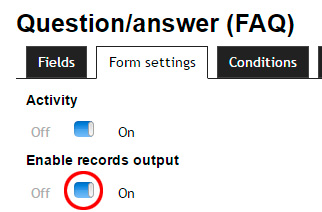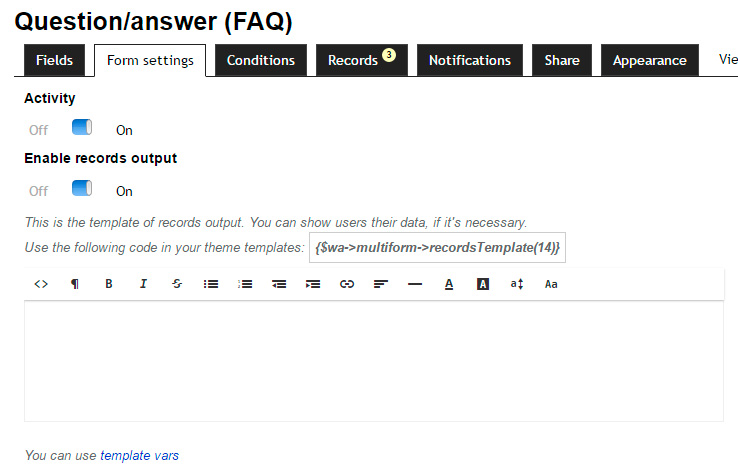Records output. Templates
If you want to output records, don't forget to change the switcher.

Create output template in admin area.

In this field you can use template vars to create output template. Use code above to display your records in theme templates.
Use helper
{$wa->multiform->records($form_id, $options)}
where
$form_id - int, - your form ID.
$options => array(
'order' => 'desc' || 'asc', - sorting, default 'desc'
'page' => int, - page number, default 1
'records_per_page' => int, - records per page, default 50
'contact_id' => int, - get records submitted by contact ID, default 0
'code_as_key' => bool, - use symbolic code of the field as key of the records, default 0
'show_files' => bool, - allow to show files, which user sent to you, default 0
);
Return data:
array(
'records_per_page' => Records per page,
'page' => Current page,
'max_page' => Maximum pages,
'records' => array( All records
record_id => array(
'id' => Record ID,
'request_id' => Request ID. Value of the settings field "Records ID format",
'create_datetime' => The datetime when form was submitted. Format: Y-m-d H:i:s,
'create_contact_id' => Contact ID which submitted the form,
'ip' => IP of the user, who submitted the form,
'comments' => [array( Admin comments
'id' => Comment ID
'record_id' => Record ID,
'name' => Name of the contact, who commented the record,
'comment' => Comment text,
'create_datetime' => The datetime when comment was added. Format: Y-m-d H:i:s,
'create_contact_id' => Contact ID which added the comment,
)],
'fields' =>[
field_id => array(
'name' => Field name,
'code' => Field code,
'type' => Field type,
'value' => array|string
[array(
'name' => Option name or file name,
'value' => Option value or file download link or file path (if 'show_files' option is active),
)]
)
]
);
);
);
 Web-forms
Web-forms